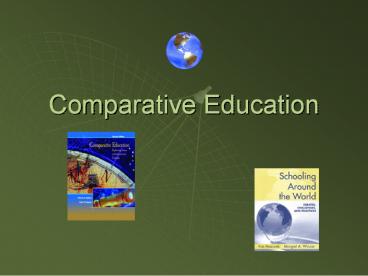Comparative Education - PowerPoint PPT Presentation
Title:
Comparative Education
Description:
Comparative Education Educational Concerns Egalitarian need for equality and opportunity for all Economic prepare for future competency and skill in the ... – PowerPoint PPT presentation
Number of Views:2395
Avg rating:3.0/5.0
Title: Comparative Education
1
Comparative Education
2
Educational Concerns
- Egalitarian need for equality and opportunity
for all - Economic prepare for future competency and
skill in the workplace - Civic educate citizens who can participate in
public life - Humanistic develop the whole person for
lifelong education
(Kubow Fossum, p. 3)
3
Rationale for Studying Comparative Education
- Broaden ones perspective and sharpen ones focus
- Understand issues from different perspectives in
different contexts - Cultural
- Social
- Political
- Need to understand the theoretical and
philosophical assumptions of each country - Can then begin to understand each countrys
educational practices.
(Kubow Fossum, p. 5)
4
What is Comparative Education?
- Draws on multiple disciplines
- Sociology
- Political Science
- Psychology
- Anthropology
- Examine the role education plays in the
individual and national development - Examine how societal values influence attitudes
about how we educate
(Kubow Fossum, p. 6)
5
What is the Purpose of Education?
- Is education a benevolent agent of change?
- Is education a mirror of the larger society,
manifesting through its structure, curriculum,
and pedagogy inherent inequalities? - Do educational practices maintain social status
quo?
(Kubow Fossum, p. 6)
6
Education and Culture
- Education plays an important role in national
progress and globalization - Comparative education provides an opportunity to
study foreign cultures and their educational
systems - Comparative education allows you to examine and
appraise your own culture and educational system - Analyze home cultures/systems and compare with
others
(Kubow Fossum, p. 6)
7
Comparative Education as a Field
- Comparative education is a field not a
discipline - Discipline dedicated to a specific set of rules
and standards - Field draws on varous disciplines to understand
the complexity - Extends and deepens our understanding of the
world - Helps educators decide
- What issues are important?
- What factors should be considered to improve
education?
(Kubow Fossum, p. 7)
8
Historical Stages of Development
- Travelers tales observatons of cultural
practices and customs - Educational borrowing 19th Century
- Observations of foreign school systems
- Identify useful techniques/practices
- Systematic scientific study 20th Century
- Examine forces shaping foreign educational
systems - Use quantitative methods to explain education
- Period of international cooperation today
- Necessary for world harmony
- Improve the quality of citizens lives
(Kubow Fossum, p. 9)
9
Perspectives
- Interpretive
- Focus on concepts and theories
- Explain educational phenomena by considering
cultural, philosophical, and historical context - Normative
- Examine differing value positions
- Develop own values about education
- Critical
- Develop ability to question contradictions and
inconsistencies in educational beliefs, policies,
and practices.
(Kubow Fossum, p. 21)
10
Comparative Perspective Taking
- Expand understanding beyond own localized
perspective - Cross-cultural investigation
- Make sense out of the new or unknown by comparing
to own frame of reference - Multiple interpretation of the issues
- Avoid dichotomous thinking
- Widen conceptual lenses
- Develop the critical thinking skills of a global
citizen - Systematic critique and reflection must accompany
curiousity
(Kubow Fossum, pp. 26-27)
11
Value of Comparative Education
- Alerts students to enduring social questions
- Helps teachers function as citizens of their
countries as well as citizens of a global society - Encourage a sprit of exploration transcending
local boundaries - Awareness that educators in different parts of
the world are wrestling with similar issues - Educators are part of a global professional
community
(Kubow Fossum, pp. 26-27)
12
Benefits
- View educaton from multiple perspectives
- Contribute to social change and educational
process - Foster international understanding
- Opportunity for global cooperation and critique
(Kubow Fossum, p. 27)

